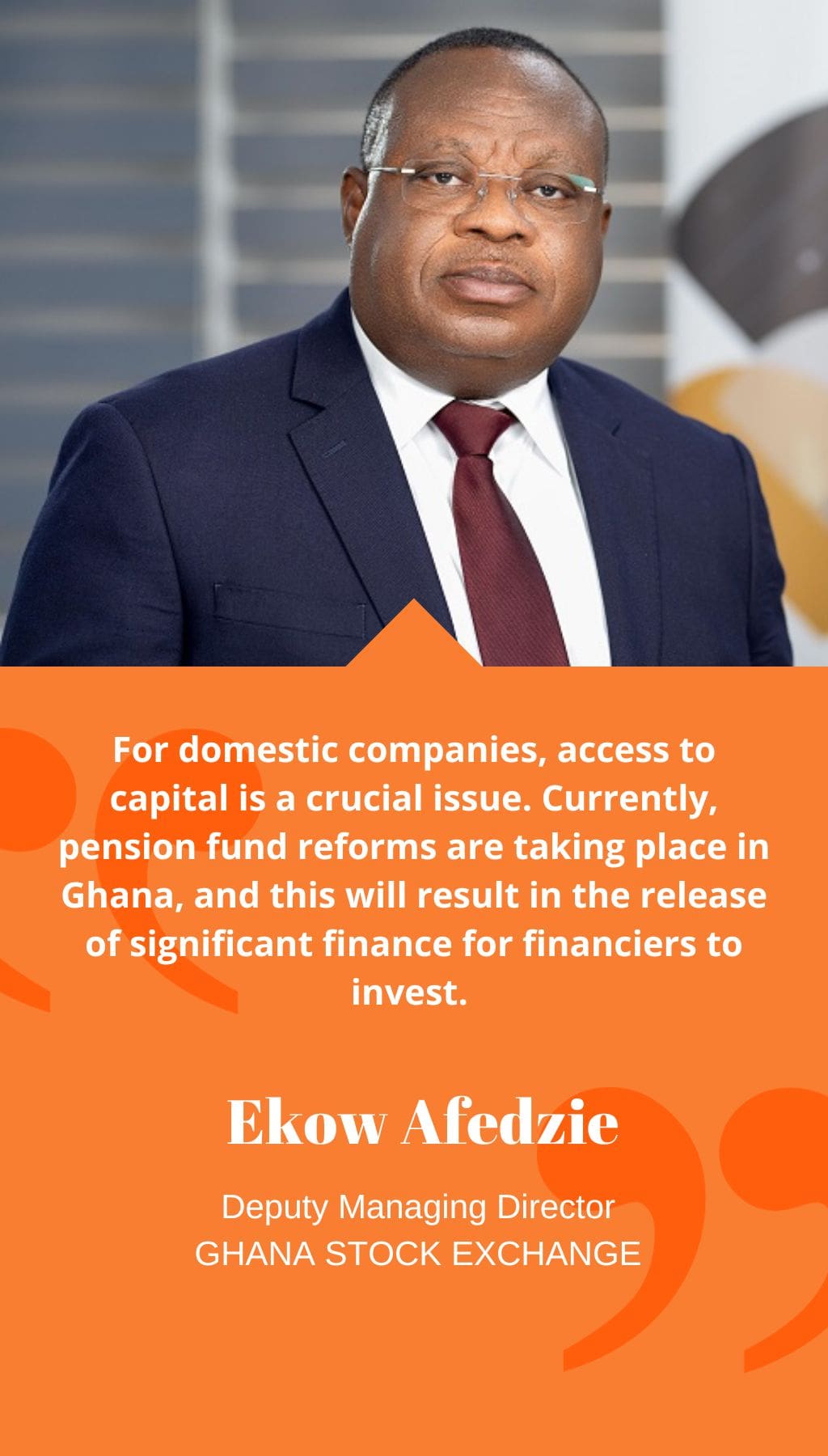
- Ghana | 3 November 2015

Can you please provide us with an overview of the Ghana Stock Exchange’s history and the major milestones it has achieved over the years?
Certainly. The Ghana Stock Exchange (GSE) commenced operations in November 1990. It is a company limited by guarantee, which means that it has members, such as associate members and license dealing members, instead of owners. The license dealing members are the brokerage firms that are authorized to trade on the exchange, while the associate members do not have the license to trade. Currently, there are 20 licensed members and 34 associate members. Our trading processes are entirely electronic, which ensures a seamless flow of transactions. This achievement won us the award for the most innovative stock market in Africa at a NYSE program last year.
What are the requirements for a company to list with the GSE?
To list with us, there are two requirements that must be met. Firstly, the company must be public and able to access the public’s vested capital. Secondly, the company must meet certain standards regarding the disclosure of information about the company, publication of their prospectus, and other criteria. For a company to list on the first list, they must have a minimum of 25% of their capital flowing to the public and file audit accounts for three years. To list on the second list, a capital minimum of 25% must also be met, but the company only needs to file an audit account for one year. We are also creating an alternative market for small-to-medium-sized businesses with good prospects, but without a track record. To achieve this, we are planning to simplify the requirements for such companies to encourage them to enter the market.
Since Tullow Oil listed on the GSE in July 2011, have any other foreign multinational corporations followed suit?
To date, no other foreign multinational corporation has listed on our exchange. However, Tullow’s partner, Kosmos, announced that they would list this year. After Tullow’s listing, the market capital doubled, and this brought along some foreign investors who were interested in investing in Ghana. Ghana was already attractive because of its political and economic stability, but Tullow Oil’s listing created an opportunity for companies to raise funds on the market, and they are likely to get foreign investors involved.
How critical is the small-to-medium-sized business sector to the growth of the Ghanaian economy?
Small-to-medium-sized businesses are vital because most of the companies in Ghana belong to this category. However, these businesses often struggle with a lack of finance to support their growth, and this has been one of the main issues hindering their growth. To contribute positively to the economy, these businesses need to have access to long-term capital. This is why we are trying to create an alternative market for them to raise funds.
What are the challenges the GSE faces in supporting small domestic companies?
So far, we have not had many of these companies coming to our market. Therefore, we need to create an environment that convinces the owners of these companies and promotes the idea of sharing and the value of the GSE. We have also encountered a few challenges with companies affected by liquidity issues. Since the majority of portfolio investors do not buy and sell all the time, there are liquidity issues. Going forward, we need to have more companies and more shares for them, which will help improve liquidity.
Can you discuss other reasons why small Ghanaian companies and foreign companies should be attracted to the Ghana Stock Exchange?
For domestic companies, access to capital is a crucial issue. Currently, pension fund reforms are taking place in Ghana, and this will result in the release of significant finance for financiers to invest. Therefore, it is an ideal time for these companies to raise capital, and the GSE can provide these opportunities. This is the primary benefit for domestic companies, and being listed on the GSE provides credibility associated with the exchange, which sets them apart from other listed companies.
What are your projections for market growth over the next 18 months?
We anticipate four to five companies listing on our market, which is likely to improve liquidity, depending on the kind of companies that come on board. In terms of returns, we believe they will remain favorable. We are also looking to introduce an alternative market in Ghana and new features into trading, such as margin trading and new products. We are considering new products that should go onto the market, and we are closely examining the corporate market to make it a more vibrant environment, which would provide more flexibility and opportunities for domestic companies to improve liquidity and the number of shares on the market.
How can the GSE be a barometer of the financial climate in Ghana when foreign investors are considering investing in Ghana?
For the GSE to be a barometer of Ghana’s financial climate, we need to have all sectors of the economy represented, including agriculture, mining, telecommunications, and more. We are trying to persuade more representatives from these industries to participate in the market. We are also striving to get policy makers to facilitate the process of getting companies to be a part of the market so that we can enjoy the fortunes of these companies locally. Although we are still in the process of achieving these goals, the market is currently performing well, and we are always on the radar when it comes to the financial market.














